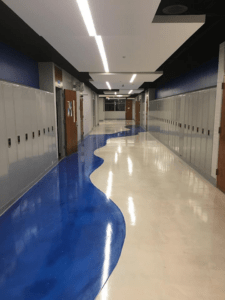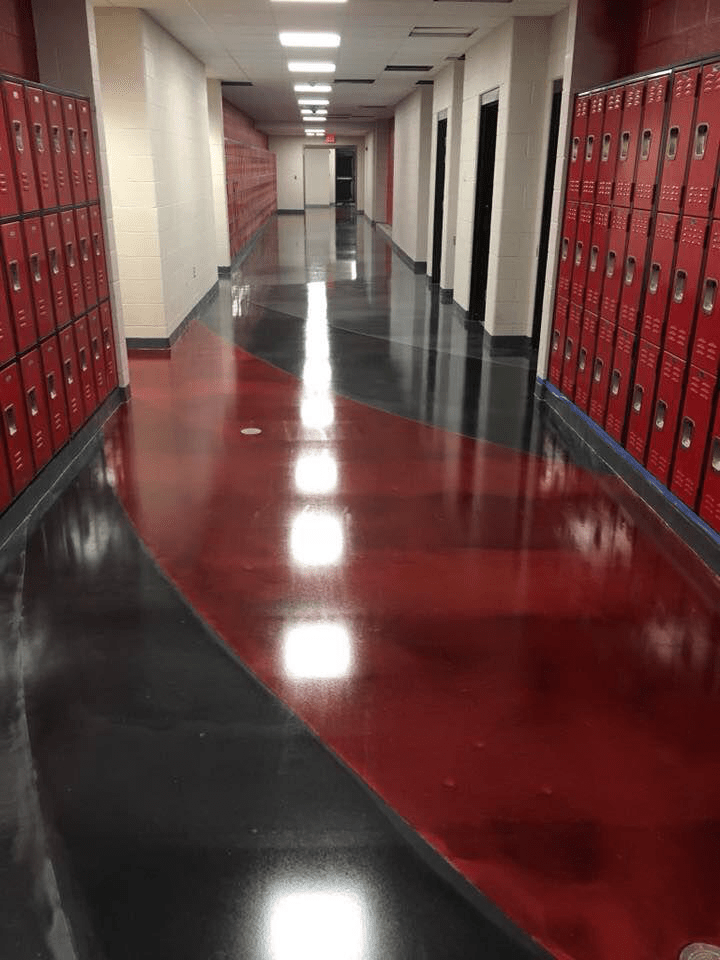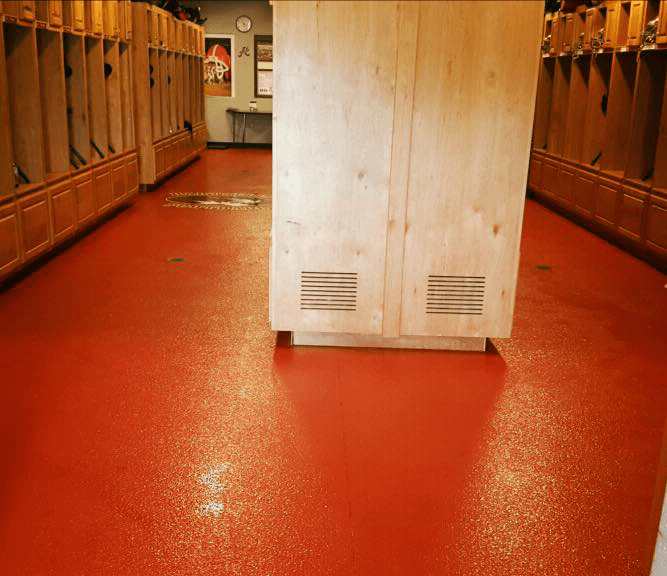Flooring technology has come a long way, offering various options for both residential and commercial properties. Among these, epoxy flooring has gained significant attention as a superior alternative to traditional concrete flooring. This blog delves into the benefits of epoxy flooring, exploring why it might be the future standard in flooring solutions.
Durability and Strength: Epoxy vs. Concrete
Epoxy Flooring
Unlike traditional concrete floors, epoxy flooring is known for its remarkable durability and strength. Made from a combination of resins and hardeners, it creates a rigid plastic material that is extremely resistant to degradation. This flooring is not only tough against physical impacts but also resistant to chemical spills, making it ideal for industrial environments.
Concrete Flooring
While concrete is inherently strong, it is more susceptible to cracking and chipping. In industrial settings, where heavy machinery and chemical spills are common, concrete floors can wear down quickly, leading to costly repairs and maintenance.
Aesthetic Appeal and Customization
Epoxy Flooring
Epoxy offers a sleek, shiny surface that can dramatically enhance the aesthetic of any space. Its versatility allows for a wide range of colors, patterns, and even 3D designs. This level of customization is not feasible with traditional concrete.
Concrete Flooring
Concrete floors are limited in terms of aesthetic appeal. While they can be painted or stained, the results are often not as vibrant or lasting as epoxy, and the options for customization are significantly more limited.

Safety Features
Epoxy Flooring
Safety is a paramount concern, especially in commercial and industrial settings. Epoxy floors can be outfitted with anti-slip additives, making them safer under wet conditions compared to traditional concrete. This feature reduces the risk of slips and falls, a common hazard in many workplaces.
Concrete Flooring
Concrete can be quite slippery, especially when wet. While there are treatments to make concrete floors less slippery, they typically do not offer the same level of safety as an epoxy coating.
Maintenance and Hygiene
Epoxy Flooring
Epoxy floors are incredibly easy to clean and maintain. Their seamless surface does not allow for the accumulation of dirt, dust, or bacteria, making them an excellent choice for environments that require high levels of hygiene, such as hospitals and food processing plants.
Concrete Flooring
Concrete is porous, making it more challenging to clean. It can absorb oils, chemicals, and other substances, which can lead to staining and require intensive cleaning methods.
Cost-Effectiveness Over Time
Epoxy Flooring
Although the initial installation cost of epoxy flooring might be higher than traditional concrete, its longevity and low maintenance requirements make it a cost-effective option in the long run.
Concrete Flooring
While the upfront cost of installing a concrete floor might be lower, the ongoing maintenance, repair costs, and shorter lifespan can make it more expensive over time.

Environmental Considerations
Epoxy Flooring
Epoxy flooring is often praised for its environmental benefits. Many epoxy formulations are low in volatile organic compounds (VOCs), making them a healthier option for indoor air quality. Additionally, their durability means less frequent replacements, reducing waste.
Concrete Flooring
Concrete production is energy-intensive and contributes significantly to carbon emissions. While it’s a durable material, its environmental impact during production is a notable consideration.
Enhanced Longevity and Performance
Epoxy Flooring
Epoxy’s resilience extends the life of the floor significantly. In environments with heavy foot traffic or machinery, epoxy withstands wear and tear much better than concrete. It’s not only resistant to surface abrasion but also to fading under UV light, a common issue in sunlit areas.
Concrete Flooring
Concrete floors, while durable, are prone to cracking over time, especially in areas with temperature fluctuations. The need for regular sealing and finishing adds to its maintenance demands, impacting its long-term performance and appearance.
Versatility Across Environments
Epoxy Flooring
Epoxy’s adaptability makes it suitable for various settings – from garages and basements to showrooms and hospitals. Its ability to resist moisture also makes it ideal for areas prone to spills or dampness, reducing the risk of mold and mildew growth.
Concrete Flooring
Concrete, while versatile, has limitations in damp environments. Without proper treatment, it can absorb moisture, leading to issues like mold, which can be both a health hazard and a structural concern.
Installation and Curing Time
Epoxy Flooring
The installation of epoxy flooring is more complex and time-consuming than concrete. It requires a clean, slightly porous, and fully cured concrete surface. However, once installed, epoxy cures within a relatively short period, providing a quick turnaround time for usage.
Concrete Flooring
Concrete is quicker to install but takes longer to cure fully. This extended curing time can delay the usage of the area, potentially disrupting business operations or home renovation timelines.

Impact on Indoor Air Quality and Comfort
Epoxy Flooring
Modern epoxy formulations focus on reducing toxic fumes and VOC emissions, making them safer for indoor use. Additionally, epoxy’s seamless and reflective surface can brighten up spaces, contributing to a more pleasant and productive environment.
Concrete Flooring
Concrete doesn’t emit VOCs but can contribute to dust if not properly sealed, impacting indoor air quality. Its hard surface can also be less comfortable for prolonged standing, a consideration for workplaces.
Eco-Friendly Options
Epoxy Flooring
Advancements in epoxy technology have led to more eco-friendly options, including formulations using bio-based ingredients. These sustainable alternatives are gaining popularity, aligning with growing environmental consciousness.
Concrete Flooring
Concrete’s environmental impact extends beyond production. Its heavy weight also increases transportation emissions. However, innovations like recycled concrete and lower-carbon cement are emerging, improving its environmental footprint.
The evolution of flooring technology has brought epoxy flooring into the spotlight as a superior alternative to traditional concrete flooring. Its durability, aesthetic flexibility, safety features, ease of maintenance, cost-effectiveness, and environmental benefits make it a compelling choice for the future of flooring. As technology advances, we can expect even more innovative solutions in the world of epoxy flooring, further solidifying its place as a preferred flooring option for various applications.Top of Form
Transform Your Space with A & P Concrete Construction
Ready to elevate your space with top-quality epoxy flooring in Little Rock, Benton, Bryant, or Sherwood? At A & P Concrete Construction, we specialize in more than just epoxy — from concrete driveways to seawall repairs; we tailor each project to your unique needs, ensuring outstanding results.
Contact us today and experience the A & P difference!